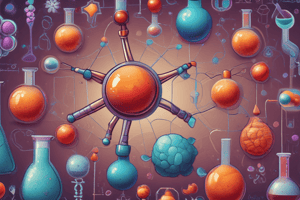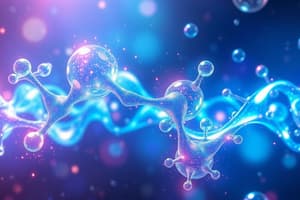Podcast
Questions and Answers
What are atoms?
What are atoms?
Atoms are the basic building blocks of all matter.
What are atoms made up of?
What are atoms made up of?
Atoms are made up of a nucleus and outer orbits.
What is the nucleus of an atom?
What is the nucleus of an atom?
The nucleus is the center of the atom where protons and neutrons are located.
What is the nucleus of a cell?
What is the nucleus of a cell?
What are elements?
What are elements?
What is a compound?
What is a compound?
What is a molecule?
What is a molecule?
What is a monomer?
What is a monomer?
What is a polymer or macromolecule?
What is a polymer or macromolecule?
What is polymerization?
What is polymerization?
What is an amino acid?
What is an amino acid?
What are the main elements that make up amino acids?
What are the main elements that make up amino acids?
How many types of amino acids are there?
How many types of amino acids are there?
What can amino acids do?
What can amino acids do?
What are proteins?
What are proteins?
What do proteins do?
What do proteins do?
What are proteins made of?
What are proteins made of?
Is protein a macromolecule or polymer?
Is protein a macromolecule or polymer?
Where do you find proteins or amino acids?
Where do you find proteins or amino acids?
What are non-essential amino acids?
What are non-essential amino acids?
What are essential amino acids?
What are essential amino acids?
What are examples of some non-essential amino acids?
What are examples of some non-essential amino acids?
What are examples of some essential amino acids?
What are examples of some essential amino acids?
What is a hydrophobic molecule?
What is a hydrophobic molecule?
What is a hydrophilic molecule?
What is a hydrophilic molecule?
What is an amphipathic molecule?
What is an amphipathic molecule?
What are some different types of proteins and how do they help the human body or cells?
What are some different types of proteins and how do they help the human body or cells?
What are proteins?
What are proteins?
Why is protein considered a polymer?
Why is protein considered a polymer?
What are the monomers in protein?
What are the monomers in protein?
What are six different types of proteins and their functions?
What are six different types of proteins and their functions?
Why do we need to eat proteins if we can produce our own?
Why do we need to eat proteins if we can produce our own?
Flashcards are hidden until you start studying
Study Notes
Atoms and Elements
- Atoms are the fundamental building blocks of all matter, both living and nonliving.
- Atoms consist of a nucleus at the center, which contains protons (positive charge) and neutrons (no charge).
- Electrons (negative charge) revolve around the nucleus in outer orbits, called electron shells.
- Elements are pure substances consisting of a specific type of atom, with 118 known elements found in the Periodic Table.
Molecules, Monomers, and Polymers
- Compounds form when two or more elements chemically bond to create molecules (e.g., Sodium chloride or NaCl).
- Monomers are small molecules made of few elements; they serve as the building blocks for larger structures.
- Polymers, also known as macromolecules, are large molecules formed by linking many monomers through chemical reactions (polymerization).
Amino Acids and Proteins
- Amino acids are the monomers that combine to form proteins, consisting mainly of carbon, hydrogen, oxygen, and nitrogen.
- There are 20 essential amino acids needed by the human body to synthesize over 20,000 different proteins.
- Proteins serve critical functions such as providing structure, support, and facilitating biochemical reactions in cells.
Essential and Non-Essential Amino Acids
- Non-essential amino acids can be synthesized by the body; examples include alanine, arginine, and asparagine.
- Essential amino acids cannot be produced by the body and must be obtained from food; examples include histidine, isoleucine, and lysine.
Protein Structure and Functions
- Proteins are long chains of amino acids and can be described as polymers or macromolecules.
- Proteins play various roles including:
- Antibodies: Help the body combat infections.
- Enzymes: Accelerate biochemical reactions.
- Hemoglobin: Carries oxygen in red blood cells.
- Actin: Aids in muscle contraction.
- Hormones: Regulate bodily functions.
- Keratin: Provides structure in nails.
Protein Sources and Importance
- Dietary proteins are vital for providing essential amino acids that the body cannot produce.
- Sources of protein include meat, eggs, dairy, rice, and beans.
- After digestion, proteins are broken down into amino acids for the body to use in creating its own proteins.
Molecule Interactions with Water
- Molecules exhibit hydrophobic (water-repelling), hydrophilic (water-attracting), or amphipathic (having both properties) characteristics depending on their chemical structure.
Summary of Protein Functions
- Proteins are crucial for building and maintaining tissues, ensuring the proper function of organs, and supporting overall health.
Studying That Suits You
Use AI to generate personalized quizzes and flashcards to suit your learning preferences.



